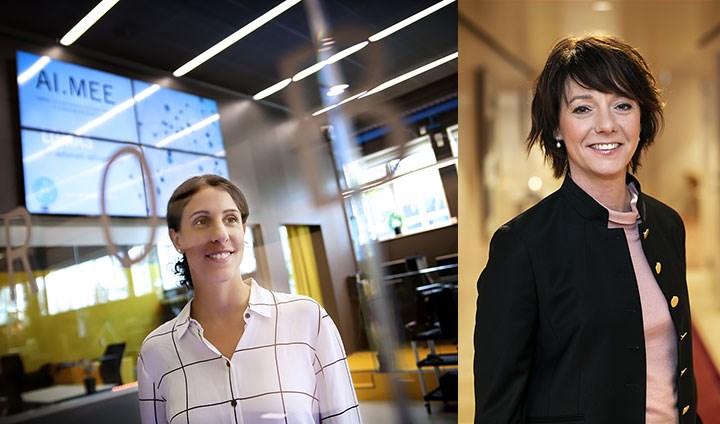Örebro University offering tuition-free AI courses for furloughed employees

“The corona crisis has hit the job market hard. Therefore, the need for lifelong learning and further training mid-career is increasing. This is the backdrop for the government’s initiative,” explains Matilda Ernkrans, Minister for Higher Education and Research. Örebro University’s Pro-Vice-Chancellor for Artificial Intelligence, Amy Loutfi, agrees: “Providing opportunities for professionals is something we’re strongly exploring.”
To counteract the consequences of the COVID-19 pandemic, the government is now investing a total of SEK 160 million in short courses and lifelong learning. A significant component of the initiative is the AI courses for working professionals that Örebro University can now offer employees who have been affected by the corona crisis.
“Short, flexible courses also on the second cycle are needed for lifelong learning, not least due to today’s rapid technological development,” says Matilda Ernkrans, Minister for Higher Education and Research.
The COVID-19 pandemic has shaken the entire world economy, affecting labour markets internationally as well as in Sweden. One effect of this is that many people now need to retrain or build on previous education to quickly find their way back to employment in the future. To meet this challenge, the government is investing SEK 130 million for lifelong learning and 30 million on short courses at higher education institutions around Sweden.
“A wise investment for both individuals and society”
“The prime minister, the government and I are resonant in our reasoning that investing in education is a wise move for both individuals and society. The fact that more people are getting the opportunity to educate themselves through this crisis and to strengthen their position, is a positive development,” says Matilda Ernkrans, Minister for Higher Education and Research. She continues:
“We see that rapid technological development means that we need to enhance our skills throughout our professional lives so that we can compete with competency also in the future. This is why we have invested in short courses in the past – and why we will continue to do so. The need for such measures has escalated since the COVID-19 pandemic hit the job market.”
The Ministry of Education and Research has pointed out three key areas to focus on: occupations in high demand, short courses and lifelong learning. When it comes to short courses, Örebro University is already at the forefront thanks to initiatives such as the Smarter scheme, which is funded by the Knowledge Foundation and offers AI courses for working professionals. Örebro University is also involved in several national and international initiatives for continuing professional development for working professionals, such as AI Competence for Sweden, AI4EU.eu, and the Vinnova-funded programme KIT (Competence needs and courses for IT professionals).
“These investments are a way for the government to continue its support of these kinds of initiatives,”explains Matilda Ernkrans.
“The investments we have already made into short courses were geared towards specifically enhancing AI competence, and Örebro University is one of the universities offering this specialisation. This new initiative will facilitate maintaining and building on the successful scheme that has already been established”, says Matilda Ernkrans.
“Exploring ways to provide opportunities for professionals”
In response to the government’s initiative, Amy Loutfi, Pro-Vice-Chancellor for AI at Örebro University, has encouraged AI researchers at the university to explore opportunities to create further second-cycle AI courses within the programme Smarter 2.0, which has been funded by the Knowledge Foundation. In addition, the university is looking into ways to increase the number of places on existing courses.
“Lifelong learning is a subject of major importance, and at Örebro University we have explored leading-edge competences within AI and looked into providing opportunities for professionals. Moving forward, it will be essential to define what role and strategy we want in terms of lifelong learning. One thing is for sure – collaboration and incentives are incredibly important, and we want to collaborate with both industry and users, as well as with other universities,” explains Amy Loutfi.
There is already today the possibility for professionals within industry to apply to four courses this autumn: Machine Learning, Part 1; Mixed Reality for Industrial Applications; Reinforcement Learning, Part 1; and Introduction to Artificial Intelligence. Watch the video about the Mixed Reality course next to this article. Now it is possible for employees to enhance their skills within AI also during the furlough period. The courses are tuition-free and will this autumn be offered remotely.
“Together we are building bridges for the future after the COVID-19 pandemic”
This past week, the Knowledge Foundation announced continued funding of the Smarter initiative. Örebro University will receive SEK 3 million to develop the existing initiative for continuing professional development within AI.
“In a time when many are being furloughed, we can offer many the chance for continued professional development within AI. Together with the Knowledge Foundation, we are building bridges for the future after the COVID-19 pandemic,” says Johan Schnürer, Vice-Chancellor at Örebro University.
Text, photo and film: Jesper Eriksson
Photo of Matilda Ernkrans: Kristian Pohl/Regeringskansliet
Translation: Jerry Gray and Charlotta Hambre-Knight

